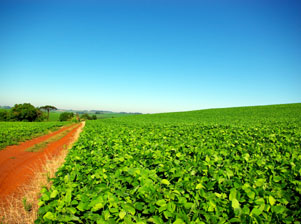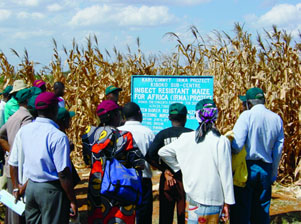
Genetically Modified Organisms (GMOs)
While working for The Cooperative Wheat Research Production Program in Mexico in 1944, scientist Norman Borlaug studied ways to minimize the loss of wheat production due to stem rust, an infectious fungus. Borlaug developed simple techniques for cross-breeding, harvesting, and planting seeds in order to produce unusually disease-resistant strains of wheat. The result was a striking growth in wheat yields. By 1963, largely due to Borlaug's techniques, Mexico was producing six times as much wheat per year as in the year before Borlaug's arrival. Borlaug took his new techniques for agriculture to other countries with food supply problems, including India and Pakistan, similarly revolutionizing their agricultural sectors. These agronomical innovations resulted in what has become known worldwide as the Green Revolution, and earned Borlaug a Nobel Peace Prize in 1970.
Over the next three decades, geneticists developed techniques for extending Borlaug's work by altering crops at the genetic level, resulting in what are known as GMOs, or genetically modified organisms. The use of GMOs has radically shifted the prevailing ground rules of world food production; for example, farmers in climates that once proved inhospitable to certain crops are now able to produce abundant harvests of varieties of those crops that have been genetically engineered to withstand the climate. The reach of GMOs extends even beyond food production, as they now frequently feature in the development of medicines.
Nevertheless, despite the great promise of this technology to benefit human quality of life, recent research has revealed potential dangers that GMOs may pose to the environment and human health. Many organizations and governments concerned with these negative effects have raised a vocal opposition to GMOs. Some countries have not only banned GMO production but also GMO research.
As evidenced by the escalating food costs that gave rise to the global food crisis of 2008, starvation remains a pressing problem in many parts of the world. Starvation is as often a consequence of inadequate food production as it is of inadequate distribution. GMOs, therefore, are as important a topic of debate today as ever. How do you view this technology? A rich understanding of the debate requires familiarity with the ongoing research, as well as the key points of both sides of the GMO debate. In this Spotlight, we provide a broad range of resources to help you gain a deeper understanding of the many sides of the GMO landscape.
Image: Tiago Fioreze.
What are GMOs?
The WHO answers the twenty most popular questions about GMOs.
Watch a streaming video presentation with a slideshow from Harvard University.
Critics, farmers, scientists, regulators, and a food industrialist discuss GMOs.
Environmental Impact
Supported financially by the European Union, this resource details GMO monitoring worldwide. Read how governments ensure that GMOs are environmentally safe.
Read a review of how some in the scientific community are critical of food-chain research that warns against GMO use. Scientific assessment of their environmental risks is contentious (pdf).
Go here for a list of major GMO plants and their biosafety information, compiled in conjunction with the Federal Ministry of Education and Research in Germany.
Norman Borlaug, Nobel Prize-winning scientist, gives a speech about the past, present, and future of GMOs (pdf).
Listen to an NPR review of "Food Inc.," a movie critical of agro-business and mass-produced food.
Read about the use of GMOs in the production of new medicines that require the harvesting of rare resources.
The benefits of GMOs are countered by power shifts in agro-business and problems of ownership.
Watch a video about political organizations in Europe that advocate a complete ban on GMO technology.
Read why the Bill & Melinda Gates Foundation is pro-GMO for the sake of the hungry throughout the world.
International response
A map shows what areas are approving imports or still approving field trials, information which is rapidly changing and tracked by the ISAAA.
Check out a summary of EU policy governing GMO production and distribution, which impacts USDA labeling.
Listen to a podcast about how GMO farming benefits the Honduran economy. For some, GMO technology offers a solution to dealing with harsh climates and pests.



























